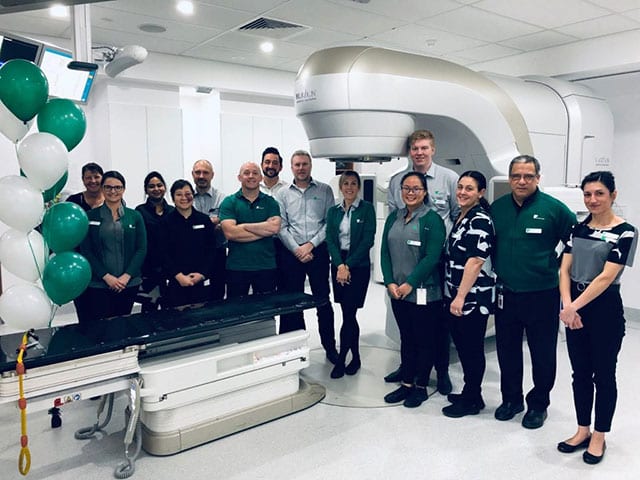- Patients
- Conditions
- Cancer conditions
- Liver cancer
Introduction
Liver cancer treatment and diagnosis
Liver cancer
Our teams of cancer specialists are experienced in many different techniques and the latest technologies to treat liver cancer that are proven to be effective. They will work together to ensure that you receive the best possible care from diagnosis through to treatment and survivorship.

Diagnostics
Chapter 1
Diagnostics
Liver cancer is often diagnosed with imaging scans, such as MRI and CT, and pathology tests such as blood tests and biopsy, although your doctor may use other tests to identify the problem. You may also have other advanced tests to find out more about your cancer, where it’s located and which treatments are likely to be most effective. Some of these tests are also used to assess how well your treatment is working.
Find your nearest GenesisCare center to find out what diagnostic tests and scans are available in your local area. Whatever your outcome, our expert team will support you throughout your treatment journey.
We offer treatments that can effectively improve your liver cancer prognosis, manage the disease and help minimize any discomfort and pain. These include surgery, ablation, embolization, chemotherapy, targeted therapy and radiation therapy. Determining the most appropriate treatment for your situation depends on the type of liver cancer you have, its stage and location. You and your doctor will work together to decide on the most appropriate treatment plan for you, tailored to your needs.
Surgery
Chapter 2
Surgery
We work with expert teams of surgeons who are specially trained in surgical removal of tumors in the liver.
When diagnosed early, surgical removal of the tumor can slow growth and control the disease and, in very early cases, potentially cure it. The most common surgical procedure for liver cancer is a hepatectomy, where your surgeon removes the cancerous part of the liver. This will only be performed if your cancer is confined to one area of the liver and your liver function liver is good.
For more serious cases, liver transplantation may be an option, but only if you meet certain criteria. In general, transplantation can be considered as an alternative to hepatectomy if your tumor cannot be removed with surgery because of its location or the liver is too diseased.
Ablation
Chapter 3
Ablation
Ablation may be an option for treating some liver cancers, your clinician may recommend ablation if you have few small tumors and you’re not fit for surgery. Ablation techniques are usually best for tumors that are no more than 3 cm across, but they may not be suitable if the cancer is close to blood vessels or bile ducts.
With image-guided ablation therapy, your clinician uses an imaging technology such as a CT scan or MRI to guide the ablation technology to the tumor site. Ablation technology includes:
- Cryotherapy – using extreme cold to freeze and destroy the tumor
- Radiofrequency – using high-energy radio waves to heat and destroy the tumor
- Laser or microwave therapy – to heat and destroy the tumor
- Ethanol ablation – using concentrated alcohol to destroy the tumor
Embolization
Chapter 4
Embolization
Arterial embolization can be used for patients liver cancer who are not candidates for surgery or ablation. Embolization therapy uses tiny particles to block the flow of blood to tumors through the artery feeding them. This destroys the cancer cells by starving them of oxygen and nutrients. In some cases, the particles may be radioactive (radioembolization) or infused with chemotherapy (chemoembolization), providing the added power of a dual-acting therapy.
Medical oncology
Chapter 5
Medical oncology
At GenesisCare, we offer various drug therapies and a wide range of the latest anti-cancer drugs for liver cancer treatment, including chemotherapy and targeted therapy.
Targeted therapy for liver cancer
As researchers know more about liver cancer, they have developed new treatments that can specifically target it. We use targeted therapy to seek and attack cellular activity that the cancer depends on to survive and grow. They are used depending on the specific genetic make up of your cancer. Types of targeted therapy for liver cancer include:
- RTK inhibitors – block the proteins that are found near or on the surface of liver cancer cells which help the tumor grow
- Angiogensis inhibitors –work by blocking the protein VEGF which promotes new blood vessel formation and helps tumors grow
Chemotherapy for liver cancer
Chemotherapy refers to drugs that destroy cancer cells. Our expert teams may recommend chemotherapy if your cancer can’t be treated with surgery, or if it hasn’t responded to other treatments such as ablation, emobilization or targeted therapies. The type of chemotherapy you’ll receive will also depend on your how advanced your liver cancer is. If your cancer has spread to other parts of your body, chemotherapy may help control its growth, relieve symptoms and improve your liver cancer prognosis.
Immunotherapy for liver cancer
Immunotherapy helps your body’s own immune system to recognize and fight the cancer and it can be used to treat liver cancer. Checkpoint inhibitors are an effective immunotherapy against some lung cancers and they work by blocking the signals that stop the immune system from attacking the cancerous liver cells.
Radiation therapy
Chapter 6
Radiation therapy
External beam radiation therapy (ERBT)
External beam radiation therapy (ERBT) delivers high-powered X-rays from outside the body, precisely targeting and shrinking or destroying tumors. Radiation therapy may be recommended after surgery to destroy any remaining cancer cells and to help prevent a recurrence or slow the growth of the disease.
At GenesisCare we offer fast access to the latest technologies and treatments that have been proven to make a difference.
Intensity-modulated radiation therapy (IMRT)
IMRT is an advanced external beam radiation therapy technique where the beams of radiation are precisely shaped to exactly match your tumor and damage to adjacent healthy tissues is limited.
Stereotactic body radiation therapy (SBRT)
SBRT uses extremely focused, high-energy radiation beams to destroy tumors in fewer treatment sessions than IMRT, sometimes five or less. It’s often used as an alternative to surgery.
Find a physician
Find a specialist in our network
Why choose GenesisCare?
Why choose GenesisCare?
GenesisCare U.S. offers community-based cancer care and other services at convenient locations. The company’s purpose is to redefine the care experience by improving patient outcomes, access and care delivery. With advanced technology and innovative treatment options, skilled physicians and support staff offer comprehensive and coordinated care in radiation oncology, medical oncology, hematology, urology, diagnostics and surgical oncology.
Read next

Who we are
With over 100 centers across Florida, we offer the latest treatments and technologies that have been proven to help patients achieve the best possible outcomes.

Working with us
Join a company with the mission to personalize cancer care and improve patient outcomes.

News room - What's been happening
From new centers and technologies to the latest innovations in care, stay on top of what we are doing

